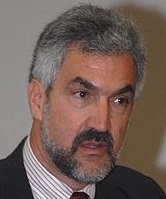The Caliphate Brings Trauma


By Daniel Pipes
Conference on “The Caliphate as a Political System: Historic Myth or Future Reality?”
August 16, 2014
I am delighted to address this timely event and thank Akber Choudhry for the opportunity to do so. I only regret that prior plans prevented me from delivering this short paper in person. I appreciate Sarah Choudhry’s willingness to read it for me. To begin:
Without warning, the ancient and long powerless institution of the caliphate returned to life on June 29, 2014. What does this event augur?
The classic concept of the caliphate – of a single successor to Muhammad ruling a unified Muslim state – lasted just over a century and expired with the emergence of two caliphs in 750 CE. The power of the caliphate collapsed in about the year 940 CE. After a prolonged, shadowy existence, the institution disappeared altogether in 1924. The only subsequent efforts at revival were trivial, such as the so-called Kalifatsstaat in Cologne, Germany. In other words, the caliphate has been inoperative for about a millennium and absent for about a century.
The group named the Islamic State in Iraq and Syria conquered the city of Mosul, population 1.7 million, in June; days later, it adopted the name Islamic State and declared the return of the caliphate. Its capital is the historic town of Raqqa, Syria (population just 220,000), which not-coincidentally served as the caliphate’s capital under Harun al-Rashid for 13 years. Under the authority of an Iraqi named Ibrahim Awwad Ibrahim, the new caliphate projects boundless ambition to rule the entire world (“east and west”) and to impose a uniquely primitive, fanatical, and violent form of Islamic law on everyone.
I have predicted that this Islamic State, despite its spectacular rise, will not survive: “confronted with hostility both from neighbors and its subject population, [it] will not last long.” At the same time, I expect it will leave a legacy:
No matter how calamitous the fate of Caliph Ibrahim and his grim crew, they have successfully resurrected a central institution of Islam, making the caliphate again a vibrant reality. Islamists around the world will treasure its moment of brutal glory and be inspired by it.
Looking ahead, here is my more specific forecast for the current caliphate’s legacy:
- Now that the ice is broken, other ambitious Islamists will act more boldly by declaring themselves caliph. There may well be a proliferation of them in different regions, from Nigeria to Somalia to Afghanistan to Indonesia and beyond.
- Declaring a caliphate has major implications, making it attractive to jihadis across the umma (the worldwide Muslim community) and compelling it to acquire sovereign control of territory.
- The Saudi state has taken on a quasi-caliphal role since the formal disappearance of the Ottoman caliphate in 1924. With the emergence of the Raqqa caliphate, the Saudi king and his advisors will be sorely tempted to declare their own version. If the current “Custodian of the Two Holy Mosques” (as the Saudi king like to be called), who just turned 90, does not indulge this claim, his successors might well do so, thereby becoming the first caliphate in a recognized state.
- The Islamic Republic of Iran, the great Shi`ite power, might well do the same, not wanting to be conceptually out-gunned by the Sunnis in Riyadh, thus becoming the second formal caliphal state.
- This profusion of caliphs will further exacerbate the anarchy and internecine hostility among Muslim peoples.
- Disillusion will quickly set in. Caliphates will not bring personal security, justice, economic growth, or cultural achievement. One after another, these self-declared universal states will collapse, be overrun, or let lapse their grandiose claims.
- This caliphate-declaring madness will end some decades hence, with a return to roughly the pre-June 29, 2014, conditions. Looking back then on the caliphal eruption, it will appear as an anachronistic anomaly, an obstacle to modernizing the umma, and a bad dream.
In short, declaring the caliphate on June 29 was a major event; and the caliphate is an institution whose time has long passed and, therefore, whose revival bodes much trauma.
Mr. Pipes (DanielPipes.org) is president of the Middle East Forum. © 2014 by Daniel Pipes. All rights reserved.
